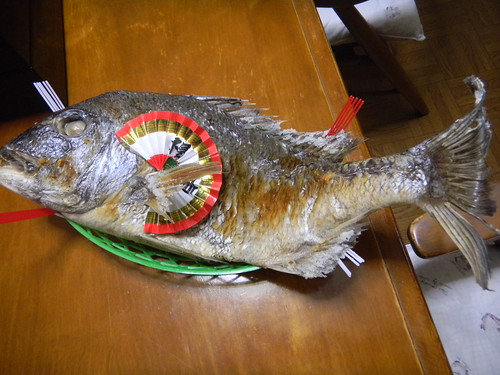
I am from a town so rural, you wouldn't believe it. Although Japan is portrayed as a metropolitan, clean, and simple city to Westerners, that's not how real Japan is all about. Whenever I say I am from Japan, first thing people usually ask is, "are you from Tokyo?" This is pretty stupid, since it's like asking any Americans "are you from New York?"
In order to show how much of a hick I am, here are the pictures where I am from, and I am proud of it, damn it!
My house is a typical traditional Japanese style architecture. Walls are made with mud, bamboo and straw, and there's no insulation. During winter months, it's always warmer to be outside than being in the hallways. I mean, each room has an individual heater to warm the room, but the hallways, bathrooms are always freezing (just a toilet, urinal and shitter, of course with an ass-washing device). On top of it, for some reason, every bathroom (again, no place where you take bath) in rural Japan keeps the windows OPEN. Even when it's snowing outside, windows are open to get rid of the bad odors. They need better ventilation systems. You can't take a shit for like 10 minutes after someone else takes one, since the odor lingers for a long time.
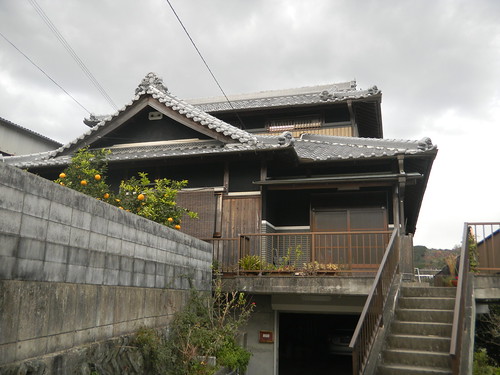
My mother has issues with throwing things away, which seems to be a disease for anyone over 60. Hence the kitchen is FILLED with crap. I tried to clean and throw bunch of things out, but she told me to "keep them in one corner" and she will debate if she should actually throw away, or keep. Needless to say, majority of them stayed.
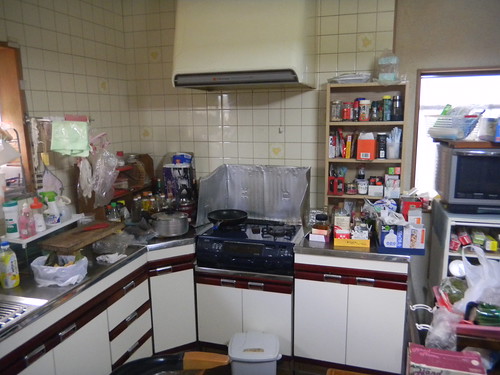
Right outside of the house is where the neighbor's vegetable garden resides. We get their harvests all the time, from daikon to lettuce to lemons to tomatoes. These fruits on the tree are called Hassaku, a type of orange that my prefecture produces 60% of, for Japan. It tastes similar to grapefruit with a similar bitterness, but sweeter.
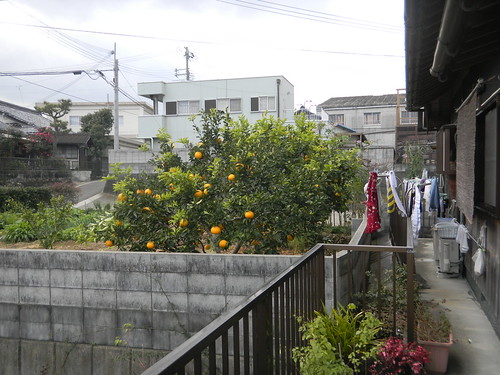
Below the house you see typical rural residential houses plus rice fields. Center mountains on the far end is Mt. Koya, which is a World Heritage Site.
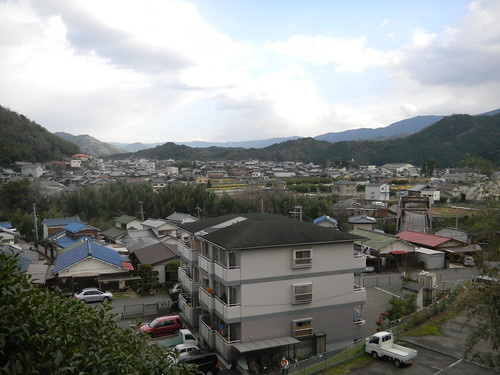
Another vegetable garden.
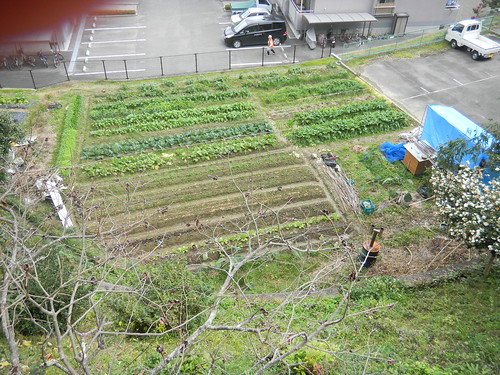
Fridgin' Out redux. Not much has changed
since last year. Top left is a clothespin that says "dry items." I don't know why mothers have to label everything. They can peek in to find out, but that's not enough, apparently. She also loves to compartmentalize everything as you can see.
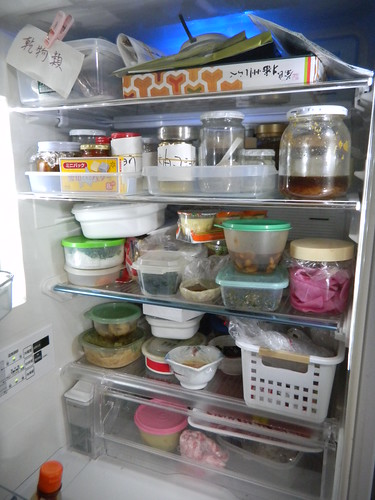
An old mixer I bought when I was in high school. I think the color choice was mine, hence pink.
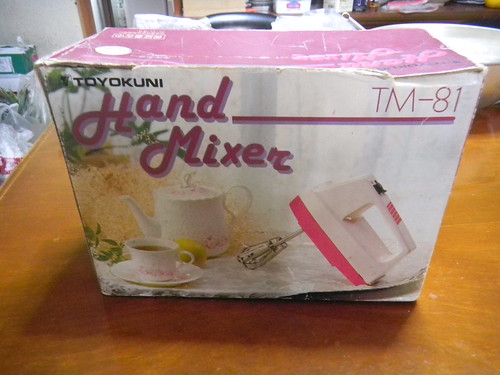
Super slow, it takes forever to make meringue but cute and retro. People in rural Japan have big enough house where they can store old items for hundreds of years, thinking they might use it again in 40.
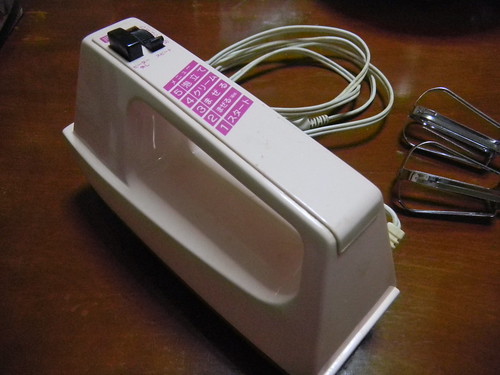
Things you shouldn't do in rural Japan: try to make macarons. With my Y
amahomo vs. Ladurée battles in NYC, I thought I was professional enough to make this in Japan. I was wrong. I had even brought almond flour with me just in case I couldn't find it. Maybe the house was too cold; or maybe the eggs too fresh (though I kept them on counter for 2 days); or maybe the consistency of powdered sugar was different? Who knows, but it was so pathetic.
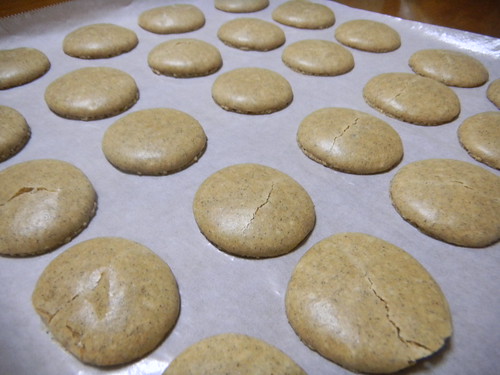
These are NOT macarons. They look so sad.
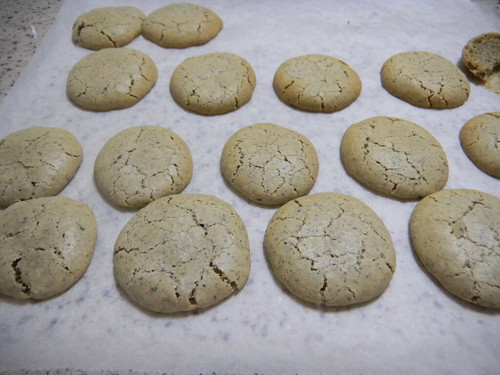
Good thing was that no one knew what a macaron was in rural Japan, so that I could get away with giving them away, saying "egg white cookie sandwich".
For New Year in rural Japan, we go all out and spend a shit load of money. Plus we give gifts to relatives in preparation for the new year.
This year, my aunt and uncle gave us a whole snapper. Come to think of it, we are always the receiver of new year gifts, not the giver. Oh well, not my problem.

Since snapper is a larger version of porgies, I remembered
the best way to eat it, which is as sashimi (with the skin on).
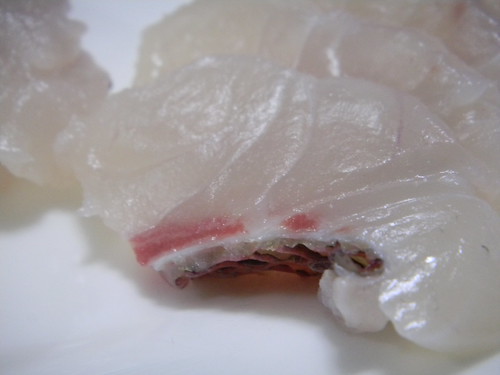
Unfortunately, it was tasteless and texture-less. We suspected the fish was farm raised, not naturally caught in the sea. Despite this nice gift, we bitched about the quality so much that mom yelled at us for not being appreciative. After all that, she said, "This fish is tasteless."
In rural Japan, marbled beef shabu-shabu is always on the menu on New Year's Eve. These guys are 800 yen for 100 grams ($50 per pound). It's awesome.
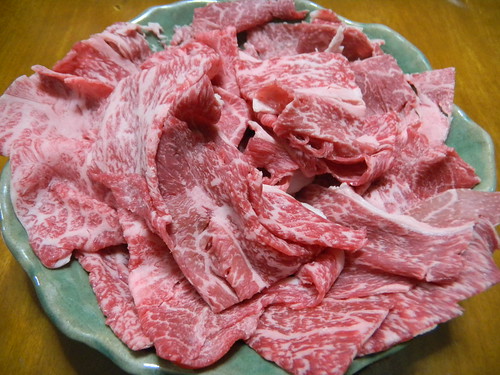
Since my family always ridicules American beef, and the lack of fat in it, they always encourage me to eat as much as possible while I'm in Japan. I had this beef on NYE at home, another batch at my grandma's house on New Year's day, another batch at my friend's house on January 2nd, and I can tell you, I am fine without it until the end of this year.
Just like Thanksgiving in the States, Osechi (New Year's food in Japan) is so traditional that we make the same thing every year. I didn't participate in the making this year since I was busy cleaning the house. If you
compare this to last year's, everything looks pretty much identical.
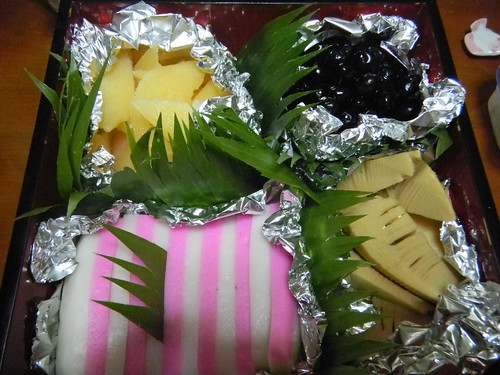
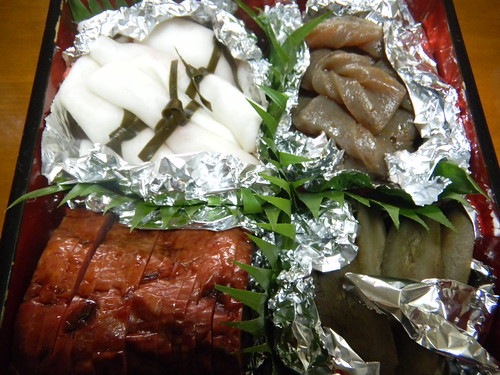
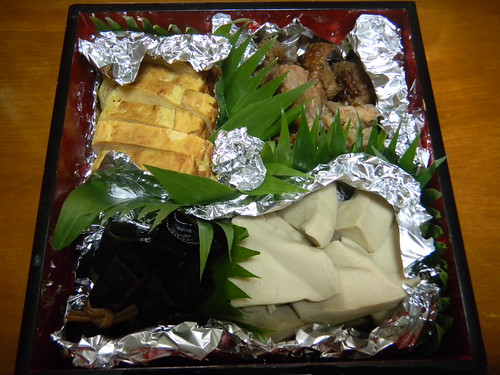
Remember
fish in a box from last year? Yes we got the same exact box this year. We had raw snapper, as well as broiled snapper this year. Snapper or 鯛 (tai) represents celebration.

Rural life is ever so great since I live in one of the most hectic cities in the world. The stars at nights look like a sky filled with garbage, and it's so weird to have chirping birds wake you up in the morning. I appreciate my hometown's slow peacefulness, but I want to keep it as my hometown, not home.
 I am from a town so rural, you wouldn't believe it. Although Japan is portrayed as a metropolitan, clean, and simple city to Westerners, that's not how real Japan is all about. Whenever I say I am from Japan, first thing people usually ask is, "are you from Tokyo?" This is pretty stupid, since it's like asking any Americans "are you from New York?"
In order to show how much of a hick I am, here are the pictures where I am from, and I am proud of it, damn it!
My house is a typical traditional Japanese style architecture. Walls are made with mud, bamboo and straw, and there's no insulation. During winter months, it's always warmer to be outside than being in the hallways. I mean, each room has an individual heater to warm the room, but the hallways, bathrooms are always freezing (just a toilet, urinal and shitter, of course with an ass-washing device). On top of it, for some reason, every bathroom (again, no place where you take bath) in rural Japan keeps the windows OPEN. Even when it's snowing outside, windows are open to get rid of the bad odors. They need better ventilation systems. You can't take a shit for like 10 minutes after someone else takes one, since the odor lingers for a long time.
I am from a town so rural, you wouldn't believe it. Although Japan is portrayed as a metropolitan, clean, and simple city to Westerners, that's not how real Japan is all about. Whenever I say I am from Japan, first thing people usually ask is, "are you from Tokyo?" This is pretty stupid, since it's like asking any Americans "are you from New York?"
In order to show how much of a hick I am, here are the pictures where I am from, and I am proud of it, damn it!
My house is a typical traditional Japanese style architecture. Walls are made with mud, bamboo and straw, and there's no insulation. During winter months, it's always warmer to be outside than being in the hallways. I mean, each room has an individual heater to warm the room, but the hallways, bathrooms are always freezing (just a toilet, urinal and shitter, of course with an ass-washing device). On top of it, for some reason, every bathroom (again, no place where you take bath) in rural Japan keeps the windows OPEN. Even when it's snowing outside, windows are open to get rid of the bad odors. They need better ventilation systems. You can't take a shit for like 10 minutes after someone else takes one, since the odor lingers for a long time.
 My mother has issues with throwing things away, which seems to be a disease for anyone over 60. Hence the kitchen is FILLED with crap. I tried to clean and throw bunch of things out, but she told me to "keep them in one corner" and she will debate if she should actually throw away, or keep. Needless to say, majority of them stayed.
My mother has issues with throwing things away, which seems to be a disease for anyone over 60. Hence the kitchen is FILLED with crap. I tried to clean and throw bunch of things out, but she told me to "keep them in one corner" and she will debate if she should actually throw away, or keep. Needless to say, majority of them stayed.
 Right outside of the house is where the neighbor's vegetable garden resides. We get their harvests all the time, from daikon to lettuce to lemons to tomatoes. These fruits on the tree are called Hassaku, a type of orange that my prefecture produces 60% of, for Japan. It tastes similar to grapefruit with a similar bitterness, but sweeter.
Right outside of the house is where the neighbor's vegetable garden resides. We get their harvests all the time, from daikon to lettuce to lemons to tomatoes. These fruits on the tree are called Hassaku, a type of orange that my prefecture produces 60% of, for Japan. It tastes similar to grapefruit with a similar bitterness, but sweeter.
 Below the house you see typical rural residential houses plus rice fields. Center mountains on the far end is Mt. Koya, which is a World Heritage Site.
Below the house you see typical rural residential houses plus rice fields. Center mountains on the far end is Mt. Koya, which is a World Heritage Site.
 Another vegetable garden.
Another vegetable garden.
 Fridgin' Out redux. Not much has changed since last year. Top left is a clothespin that says "dry items." I don't know why mothers have to label everything. They can peek in to find out, but that's not enough, apparently. She also loves to compartmentalize everything as you can see.
Fridgin' Out redux. Not much has changed since last year. Top left is a clothespin that says "dry items." I don't know why mothers have to label everything. They can peek in to find out, but that's not enough, apparently. She also loves to compartmentalize everything as you can see.
 An old mixer I bought when I was in high school. I think the color choice was mine, hence pink.
An old mixer I bought when I was in high school. I think the color choice was mine, hence pink.
 Super slow, it takes forever to make meringue but cute and retro. People in rural Japan have big enough house where they can store old items for hundreds of years, thinking they might use it again in 40.
Super slow, it takes forever to make meringue but cute and retro. People in rural Japan have big enough house where they can store old items for hundreds of years, thinking they might use it again in 40.
 Things you shouldn't do in rural Japan: try to make macarons. With my Yamahomo vs. Ladurée battles in NYC, I thought I was professional enough to make this in Japan. I was wrong. I had even brought almond flour with me just in case I couldn't find it. Maybe the house was too cold; or maybe the eggs too fresh (though I kept them on counter for 2 days); or maybe the consistency of powdered sugar was different? Who knows, but it was so pathetic.
Things you shouldn't do in rural Japan: try to make macarons. With my Yamahomo vs. Ladurée battles in NYC, I thought I was professional enough to make this in Japan. I was wrong. I had even brought almond flour with me just in case I couldn't find it. Maybe the house was too cold; or maybe the eggs too fresh (though I kept them on counter for 2 days); or maybe the consistency of powdered sugar was different? Who knows, but it was so pathetic.
 These are NOT macarons. They look so sad.
These are NOT macarons. They look so sad.
 Good thing was that no one knew what a macaron was in rural Japan, so that I could get away with giving them away, saying "egg white cookie sandwich".
For New Year in rural Japan, we go all out and spend a shit load of money. Plus we give gifts to relatives in preparation for the new year.
This year, my aunt and uncle gave us a whole snapper. Come to think of it, we are always the receiver of new year gifts, not the giver. Oh well, not my problem.
Good thing was that no one knew what a macaron was in rural Japan, so that I could get away with giving them away, saying "egg white cookie sandwich".
For New Year in rural Japan, we go all out and spend a shit load of money. Plus we give gifts to relatives in preparation for the new year.
This year, my aunt and uncle gave us a whole snapper. Come to think of it, we are always the receiver of new year gifts, not the giver. Oh well, not my problem.
 Since snapper is a larger version of porgies, I remembered the best way to eat it, which is as sashimi (with the skin on).
Since snapper is a larger version of porgies, I remembered the best way to eat it, which is as sashimi (with the skin on).
 Unfortunately, it was tasteless and texture-less. We suspected the fish was farm raised, not naturally caught in the sea. Despite this nice gift, we bitched about the quality so much that mom yelled at us for not being appreciative. After all that, she said, "This fish is tasteless."
In rural Japan, marbled beef shabu-shabu is always on the menu on New Year's Eve. These guys are 800 yen for 100 grams ($50 per pound). It's awesome.
Unfortunately, it was tasteless and texture-less. We suspected the fish was farm raised, not naturally caught in the sea. Despite this nice gift, we bitched about the quality so much that mom yelled at us for not being appreciative. After all that, she said, "This fish is tasteless."
In rural Japan, marbled beef shabu-shabu is always on the menu on New Year's Eve. These guys are 800 yen for 100 grams ($50 per pound). It's awesome.
 Since my family always ridicules American beef, and the lack of fat in it, they always encourage me to eat as much as possible while I'm in Japan. I had this beef on NYE at home, another batch at my grandma's house on New Year's day, another batch at my friend's house on January 2nd, and I can tell you, I am fine without it until the end of this year.
Just like Thanksgiving in the States, Osechi (New Year's food in Japan) is so traditional that we make the same thing every year. I didn't participate in the making this year since I was busy cleaning the house. If you compare this to last year's, everything looks pretty much identical.
Since my family always ridicules American beef, and the lack of fat in it, they always encourage me to eat as much as possible while I'm in Japan. I had this beef on NYE at home, another batch at my grandma's house on New Year's day, another batch at my friend's house on January 2nd, and I can tell you, I am fine without it until the end of this year.
Just like Thanksgiving in the States, Osechi (New Year's food in Japan) is so traditional that we make the same thing every year. I didn't participate in the making this year since I was busy cleaning the house. If you compare this to last year's, everything looks pretty much identical.


 Remember fish in a box from last year? Yes we got the same exact box this year. We had raw snapper, as well as broiled snapper this year. Snapper or 鯛 (tai) represents celebration.
Remember fish in a box from last year? Yes we got the same exact box this year. We had raw snapper, as well as broiled snapper this year. Snapper or 鯛 (tai) represents celebration.
 Rural life is ever so great since I live in one of the most hectic cities in the world. The stars at nights look like a sky filled with garbage, and it's so weird to have chirping birds wake you up in the morning. I appreciate my hometown's slow peacefulness, but I want to keep it as my hometown, not home.
Rural life is ever so great since I live in one of the most hectic cities in the world. The stars at nights look like a sky filled with garbage, and it's so weird to have chirping birds wake you up in the morning. I appreciate my hometown's slow peacefulness, but I want to keep it as my hometown, not home.



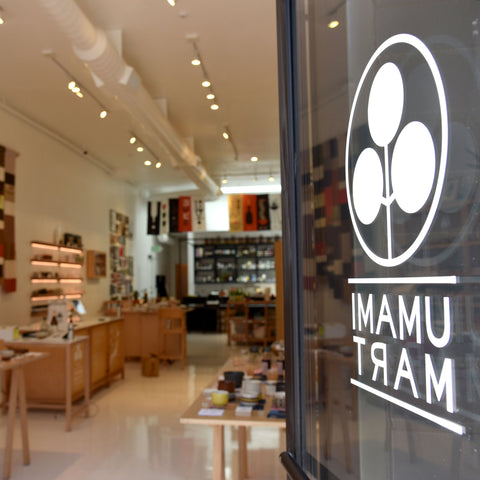
Comments (4)
This is a true Umamimat post, love love.
I’m sure if anyone at your highschool had seen your little gay handmixer you wouldn’t be alive today though.
that’s why I went to private school, far from my hometown.
excellent. the macarons look like camoufraging as ‘soba-bouro’…
oops, camouflaging…! my katakana english slipped out.